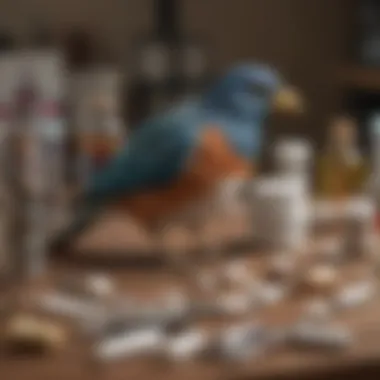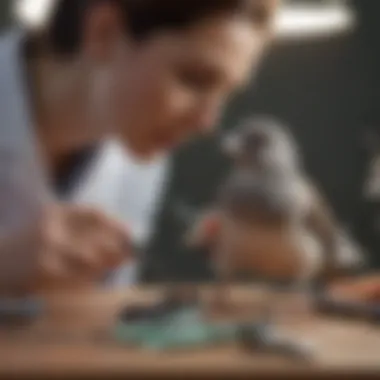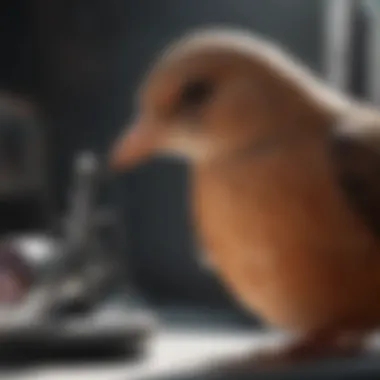Essential Bird Medical Supplies for Avian Health


Intro
Taking care of birds requires a comprehensive understanding of their unique needs and health requirements. Each bird is distinct in terms of behavior, diet, and environment. Investing time into learning about bird medical supplies can make a significant difference in ensuring your pet’s well-being. Whether you own a parrot, budgerigar, or canary, knowing what medical supplies are essential will help provide a better quality of life for your companion.
This article seeks to educate bird enthusiasts about the tools necessary for avian health. It will cover essential supplies, proper usage practices, as well as details on how these items contribute to your bird’s overall health. By the end, you will better understand how to implement effective strategies for maintaining avian health through appropriate medical supplies.
Understanding Bird Medical Supplies
Bird medical supplies are crucial for maintaining the health and well-being of pet birds. The significance of these supplies cannot be overstated, as they facilitate proper care and timely interventions when avian health issues arise. An understanding of these tools equips bird owners with the knowledge to act effectively during medical emergencies or routine care.
Definition and Importance
The term "bird medical supplies" encompasses a wide range of products designed specifically for avian health. These include first aid kits, medications, diagnostic tools, and various specialty items. The importance of these supplies lies in their potential to prevent complications and support recovery. For example, having a properly stocked first aid kit can be the difference between life and death in acute scenarios, while regular use of specific medical supplies can lead to early detection of health issues.
In addition, understanding the role of these supplies fosters responsible pet ownership. Committing to care means preparing for the unexpected and ensuring that one's bird receives appropriate attention when needed. This preparation includes having the right tools at hand, as well as knowledge on how and when to use them.
Types of Bird Medical Supplies
Bird medical supplies fall into several categories, each addressing specific needs and conditions.
- First Aid Supplies: These include bandages, antiseptic solutions, and tweezers. They are used for immediate treatment of superficial injuries and infections.
- Medications: Various forms of medications are vital for treatment. This includes antibiotics, antifungals, and anti-inflammatory drugs.
- Diagnostic Tools: These may range from simple thermometers to more advanced devices for monitoring heart rate or respiratory function. Such tools help in assessing the general state of health in birds.
- Nutritional Supplies: These include vitamins, mineral supplements, and special diets designed to boost avian health.
- Grooming Tools: Essential for maintaining feather health and preventing skin issues, these tools aid in proper hygiene and aesthetic appearance as well.
Understanding these types not only enhances the ability to provide care but also informs owners of the evolving needs as their birds age or face health challenges. By familiarizing themselves with this range, bird owners can approach avian health with confidence.
Essential Medical Supplies for Birds
Birds, like any other pet, require proper medical care. The significance of having essential medical supplies cannot be overstated. Having these supplies readily available helps in managing health issues proactively, ensuring that emergencies can be handled swiftly and effectively. In this section, we delve into several critical components of avian health care, focusing on First Aid Kits, Medications, and Diagnostic Tools.
First Aid Kits
A well-equipped first aid kit is fundamental for bird owners. This kit serves as the first line of defense in emergencies. It allows avian caretakers to respond to injuries or sudden health issues promptly. Key items to include in a bird first aid kit are antiseptic wipes, gauze pads, adhesive tape, and tweezers. Each item plays a vital role in managing wounds and preventing further issues.
Establishing a first aid kit tailored to your bird’s needs can greatly ease stress during an emergency. Consider any specific conditions your bird may have, as this can influence the contents of your kit. Regular checks and updates ensure that supplies remain effective and ready for use when needed.
Medications
Medications are crucial for treating various ailments in birds. They often ensure the continuity of care and aid in recovery. The right medication can significantly impact a bird's health. However, it's important to use these medicines properly and under the guidance of a veterinarian.
Types of Medications
There are various types of medications available for birds. These can include anti-inflammatories, antibiotics, and antifungals, each addressing different health concerns.
- Anti-inflammatories: These medications can reduce swelling and discomfort. They are essential in treating injuries and certain conditions, providing relief.
- Antibiotics: Often prescribed for bacterial infections, antibiotics can prevent complications when used correctly. It is critical to complete the full course of treatment as directed.
- Antifungals: These are typically required for fungal infections. They help return the bird to health, preventing further complications.
Using the right type of medication can promote a quicker recovery for the bird, minimizing the risk of serious health issues. However, issues may arise with incorrect dosages or reactions. Thus, understanding each medication's benefits is important.
Administration Methods
Administering medications is an integral part of avian health care. The methods can vary based on the bird's species and the specific medication.
- Oral administration is common and can involve mixing medication with food or water. It is straightforward but can lead to refusal by the bird.
- Injections may be necessary in some cases. They are effective but require more skill and caution to prevent injury.
- Topical applications work for skin issues and might be less stressful for the bird compared to injections.
Each method has distinct advantages and disadvantages. Oral methods might be easier but less reliable if the bird refuses food. Injections are effective but require careful handling. Administering medication must be done with care to ensure the bird’s comfort and health outcomes.


Diagnostic Tools
Lastly, having diagnostic tools is vital for effective bird health care. These tools aid in early detection of health issues. Common tools include thermometers, scales, and stethoscopes. Utilizing them can provide preliminary insights into a bird's well-being.
Bird owners who monitor their feathered companions regularly will notice changes in behavior or appearance, which could be signals of health issues. Regularly assessing vitals or weight helps catch problems early on. Proper diagnostic tools in the home prove to be invaluable in ensuring the health and longevity of avian companions.
Specialized Supplies for Common Conditions
Specialized supplies play a critical role in addressing specific health issues that can affect birds. Understanding these supplies can provide pet owners with the necessary tools to care for their feathered companions effectively. Proper management of common avian health conditions is essential for preventing further complications and ensuring a better quality of life for these animals. By selecting the right supplies, owners can take proactive measures in promoting their birds' health.
Respiratory Ailments
Respiratory health is vital for birds, as they rely heavily on their ability to breathe properly. Conditions like infections, allergies, or environmental irritants can lead to significant respiratory issues. Specialized supplies, such as nebulizers and specific medications, are important for treating these problems. Nebulizers help administer medication directly to the respiratory tract, allowing for quick relief. Additionally, antiseptic solutions can clean the environment and reduce irritants that may worsen respiratory conditions.
Recognizing symptoms like wheezing or labored breathing early is crucial. Supplies like oxygen masks or humidifiers can be lifesaving in acute situations. Ensuring proper air quality, free from pollutants, is also a preventive strategy that all bird owners should consider.
Feather Disorders
Feather conditions, though less recognized, can significantly impact a bird's comfort and health. Problems such as feather plucking or loss may have underlying physical or psychological causes. Here, specialized care products like feather conditioners and anti-plucking collars become essential. Nutritional supplements containing biotin and other vitamins can also aid in promoting healthy feather growth.
Understanding the requirements of specific bird breeds can inform what specialized supplies are necessary. For instance, some species may require specific diets that can be supplemented with special products designed for feather health. Furthermore, consulting with a vet helps identify the root cause of disorders, which is key to effective treatment.
Digestive Problems
Digestive health in birds frequently affects their overall well-being. Common issues include crop impaction, diarrhea, or more serious gastrointestinal disorders. Specialized supplies like probiotics, electrolytes, and specific diets can facilitate recovery from digestive disturbances. Probiotics help restore gut flora, which is important for digestion and absorption of nutrients.
In cases of severe digestive problems, specialized syringes designed for administering medications may be necessary. It is essential to monitor a bird's droppings for any signs of abnormality, as this can provide crucial insights into their digestive health. In addition, owners should ensure a varied diet that meets the nutritional needs of their birds to prevent such problems from arising.
"Understanding the specialized supplies for avian welfare can transform the approach to pet birds' health management."
In summary, providing targeted support through specialized supplies for common conditions is an essential part of avian care. By leveraging these tools, bird owners can improve both the health outcomes and quality of life for their pets. Educating oneself about the specific needs associated with respiratory, feather, and digestive health is instrumental in fostering a healthier environment for birds.
Preventive Care and Maintenance Supplies
Preventive care and maintenance supplies are critical components of avian health management. These supplies help to maintain the well-being of birds, preventing potential health issues before they become serious problems. Regular use of nutritional supplements and grooming tools can alleviate health risks and ensure that pet birds lead long, healthy lives. Focusing on preventive care can save both time and costs associated with emergency treatments.
Nutritional Supplements
Nutritional supplements play a vital role in providing the essential vitamins and minerals that may be lacking in a bird's diet. Birds require a balanced diet rich in nutrients, but various factors can impact their intake. Environmental changes, dietary preferences, and even seasonal variations can contribute to these deficiencies.
Adding specific supplements can enhance a bird's immune system and overall health. Common nutritional supplements include:
- Vitamin A: Supports feather health and immune function.
- Calcium: Important for bone development and egg laying.
- Omega Fatty Acids: Ensure a shiny and healthy plumage.
It is important to choose high-quality supplements tailored to the specific species. Over-supplementation can lead to toxicity and other health issues, so it is always prudent to follow dosage guidelines. Consulting with a veterinarian is advisable for determining the right supplements needed for a specific bird.
Grooming Tools
Grooming tools are essential for maintaining a bird's physical appearance and health. Regular grooming helps to reduce feather-related disorders and supports the overall hygiene of the bird. Some common grooming tools include:
- Nail Clippers: Prevent overgrowth that can cause pain and difficulty in movement.
- Beak Trimmers: Help to keep beaks in shape, preventing overgrowth that can obstruct feeding.
- Fleece or Paper Towels: Useful for cleaning the cage and environment, ensuring a hygienic living space.
A well-groomed bird is not only more comfortable but also less prone to infections and skin conditions. Regular grooming sessions are a great opportunity for bonding between the bird and their owner, enhancing the overall relationship.
"Prevention is better than cure; regular maintenance prevents discomfort and illness in pet birds."


In summary, investing in preventive care and maintenance supplies is a fundamental aspect of avian pet ownership. By addressing nutritional needs and ensuring proper grooming, owners can contribute significantly to the health and quality of life for their birds.
Distribution and Availability of Bird Medical Supplies
The distribution and availability of bird medical supplies is a critical aspect of ensuring proper avian health. Whether it's an emergency situation or routine care, access to the right tools and medications can significantly influence outcomes for birds. Understanding where to source these supplies and the considerations involved makes a vital difference for bird owners.
Informed decision-making is key when selecting medical supplies. One should focus on quality and suitability for specific needs. Factors such as reputation of dealers, availability of products, and accessibility to consumers can determine the effectiveness of care provided. Therefore, ensuring that reliable resources are within reach boosts owners' confidence.
"A well-equipped owner can address health issues swiftly, which is paramount in avian species given their delicate nature."
Where to Buy
Finding the right outlets for bird medical supplies can be challenging without proper guidance. Here are some common sources:
- Pet Stores: Many local pet shops stock essential bird supplies. It often includes basic medical equipment and preventative care products.
- Veterinary Clinics: Veterinary professionals frequently have a selection of medical supplies available for clients. This can be a great option for purchasing specific items recommended during avian healthcare consultations.
- Specialty Shops: Some retailers specialize exclusively in avian products. They are likely to carry a diverse range of medical tools suited for various bird species.
When considering purchases, always check for the legitimacy of the retailers. Review their offerings and ensure they follow recommended standards for animal welfare.
Online Resources and Retailers
The rise of e-commerce has expanded access to bird medical supplies significantly. Online shopping allows for easy comparisons of product options and prices, along with user reviews. Here are some trusted online sources:
- Major E-commerce Sites: Websites like Amazon and Chewy offer a wide selection of bird care products. They provide detailed descriptions and customer feedback, which can help in making decisions.
- Specialized Online Retailers: Platforms like BirdSupplies.com cater specifically to avian needs. Often, they might have unique items not available in brick-and-mortar stores.
- Veterinary Supply Companies: Online veterinary supply firms offer a range of products and often carry prescription medications for birds.
When buying supplies online, verify the credibility of the retailer, especially for medications. Avoid purchasing from unverified sources to prevent safety issues.
Handling Emergencies: Acute Medical Needs
In the realm of avian care, understanding how to handle medical emergencies is crucial. Birds are often unable to communicate their discomfort or health issues directly, which makes it essential for owners to be aware of any signs of distress. This section delves into why recognizing acute medical needs is key for the well-being of these pets.
Recognizing Signs of Distress
Birds exhibit a range of behaviors when they are unwell or distressed. Being able to identify these signs quickly can make a significant difference in the outcome of their health issue. Common indicators include:
- Changes in vocalization: Birds may become unusually quiet or, conversely, more vocal than usual.
- Physical appearance: Observe any unusual posture, fluffing of feathers, or visible injuries.
- Eating habits: A sudden decrease or increase in food and water intake can signal illness.
- Activity level: A decrease in activity or lethargy is often a sign of distress.
- Respiratory distress: Watch for difficulty breathing or excessive panting.
- Behavioral changes: Increased aggression or withdrawal from social interaction can indicate issues.
Each symptom might indicate various problems, from minor to serious. Hence, closely monitoring your bird's behavior is vital. The sooner you detect these changes, the quicker you can respond, which may prevent larger health crises.
Immediate Actions to Take
When you notice signs of distress in your bird, immediate and appropriate actions are necessary. Here's a guide to handling such emergencies effectively:
- Stay calm: Your bird can sense your emotions. A calm demeanor helps keep them more relaxed.
- Assess the situation: Try to quickly determine if the issue is a temporary discomfort or a serious emergency.
- Provide a safe space: Secure your bird in a quiet area, away from noise and commotion. Ensure they feel safe.
- Observe closely: Monitor their breathing, movement, and general behavior to gather more information for your veterinarian.
- Contact a veterinarian: If the situation seems serious, don’t hesitate to reach out to your avian vet. Provide as much information as possible about the symptoms.
- Prepare for transport: If advised to bring your bird in, have a secure carrier ready. Make it comfortable and ensure adequate ventilation.
Taking swift action can be the difference between recovery and severe complications. Your attentiveness is vital.
Handling emergencies effectively is not just about knowledge; it’s about preparation and maintaining a robust relationship with veterinary professionals. This ensures that you are ready to tackle any acute medical needs that arise.
Consultation with Veterinary Professionals
Consultation with veterinary professionals is a crucial aspect of avian health care. Birds, like any other pet, can face various health issues. Understanding when and how to involve a qualified veterinary expert can significantly impact the health outcomes for your feathered companions. A veterinarian provides essential guidance that ensures bird owners are well-informed about their aviary pets' needs.
When to Seek Veterinary Care


Recognizing the right moments to seek veterinary care can be vital. Here are some situations that should prompt a visit to an avian vet:
- Sudden Behavioral Changes: If your bird is unusually quiet, lethargic, or exhibits erratic behavior, these may be signs of illness.
- Physical Symptoms: Signs such as swollen eyes, abnormal droppings, or feather loss warrant immediate attention.
- Injury or Trauma: If your bird has experienced a fall or injury, you should seek professional help promptly.
- Dietary Changes: Any drastic change in eating habits may indicate health problems.
- Change in Vocalization: If your bird stops singing or speaking, it might be unwell.
Being proactive in these situations can prevent minor issues from escalating into severe health problems.
Choosing the Right Avian Vet
Selecting an appropriate veterinary professional is essential for the long-term health of your bird. Here are some key considerations when choosing an avian veterinarian:
- Specialization: Ensure that the vet has specific experience and training in avian medicine. Birds have unique anatomical and physiological needs that differ from other pets.
- Reputation: Look for reviews or seek recommendations from fellow bird owners. A vet with positive feedback is more likely to provide excellent care.
- Facility Resources: The veterinary clinic should have the necessary resources to handle emergencies and routine care.
- Comfort Level: It's important that both the bird and the owner feel comfortable with the vet. A good rapport can lead to better communication and care.
- Accessibility: Consider the location and availability of the vet. Having a local, responsive vet can make a major difference in emergency situations.
Choosing the right avian vet can often mean the difference between a healthy pet and one that struggles with illness. Make this decision carefully for the benefit of your delightful feathered friend.
A well-informed owner is one step closer to ensuring a bird's health and well-being. Regular consultations with veterinary professionals can help catch issues early and maintain overall health.
Regulations and Ethical Considerations
Understanding the regulations and ethical considerations surrounding bird medical supplies is vital for any bird owner or enthusiast. This topic encompasses legal frameworks that govern the purchase and use of veterinary products, as well as ethical responsibilities toward ensuring the well-being of avian companions. Ignorance of these regulations can lead to serious consequences, including legal repercussions and harm to your pet. It is crucial to navigate this landscape thoughtfully.
Legal Requirements for Supplies
When dealing with bird medical supplies, adhering to legal requirements is essential. Each country has its own set of laws that regulate the sale, distribution, and use of veterinary supplies. In many regions, a prescription from a licensed veterinarian is required for certain medications. This ensures that bird owners are using the right products for their pets, minimizing the risk of misuse.
It is also important to be aware of regulations regarding the sale of medical devices and supplements. For instance, the Food and Drug Administration in the United States oversees the regulation of veterinary drugs to ensure they are safe and effective.
Some key points to consider include:
- Licensing and Certifications: Ensure that any veterinary service or supplier is properly licensed.
- Record Keeping: Maintain records of all medications and treatments administered to your birds. This is not only good practice but may also be legally required.
- Compliance with Local Laws: Different states or countries may have additional laws regarding specific supplies, so educate yourself accordingly.
Ethical Sourcing of Veterinary Products
Ethical sourcing is another cornerstone of responsible bird ownership. This aspect considers how medical supplies are obtained and the impact of those practices on animal welfare. When choosing supplies, it is essential to look for products from reputable companies that prioritize animal welfare in their manufacturing processes.
Here are some considerations for ethical sourcing:
- Product Transparency: Look for brands that provide full disclosure on ingredients and sourcing practices.
- Cruelty-Free Testing: Favor products that do not conduct animal testing or come from suppliers known for ethical practices.
- Environmental Impact: Consider the ecological impact of medical supplies and opt for sustainable options when available.
"Responsible bird ownership is not just about care; it also extends to understanding the regulations and ethics behind the products you choose."
Overall, following these guidelines can help navigate the complexities of bird medical supplies while ensuring the utmost care for your feathered friends.
Future Trends in Bird Medical Supplies
The realm of bird medical supplies is evolving rapidly. As the demand for avian care increases, so does the innovation in products and practices that support bird health. Understanding future trends in this field is essential for bird owners and professionals alike. These trends not only indicate the direction of avian healthcare practices but also highlight improvements in treatment and prevention approaches.
Innovations in Bird Healthcare
Innovations are at the core of enhancing bird health management. The development of specialized medical supplies tailored for birds ensures better outcomes. Examples include targeted medications for common avian diseases or nutraceuticals aimed at specific health issues. For instance, tools for administering medication have improved. Syringes designed for small beaks allow pet owners to give precise doses, reducing stress for the bird. These advancements empower owners, enabling them to provide better care at home.
Other innovations involve the use of telemedicine. This allows avian vets to consult with pet owners remotely. This approach is convenient for those who may struggle to visit a vet due to distance or time constraints. With visual component, professionals can evaluate symptoms and suggest treatment options, enhancing the quality of care and accessibility.
Technological Advances in Veterinary Medicine
Technology plays a significant role in advancing veterinary practices for birds. One such advancement is the integration of digital health records. These records help track the health history of pets, providing quick access to relevant information. With this data, avian vets can make informed decisions regarding treatment and preventive measures.
Furthermore, diagnostic tools have become more sophisticated. Portable ultrasound machines and digital endoscopes enable vets to diagnose conditions quickly and accurately. This not only reduces the time it takes to identify issues but also minimizes discomfort for the bird.
"The integration of technology in avian medicine represents a monumental leap in how we approach bird health. We can offer precise, timely interventions that were not previously possible."
In addition, social media and other online platforms provide a wealth of resources for bird owners. Communities of enthusiasts gather in forums like Reddit or Facebook, sharing experiences, advice, and information about the latest medical supplies and trends. This collective knowledge is invaluable, aiding owners in making informed decisions about their feathered companions.







